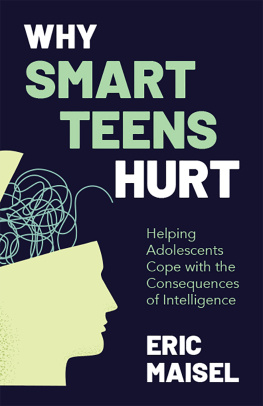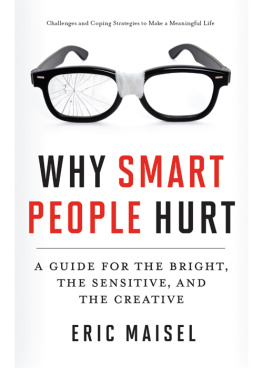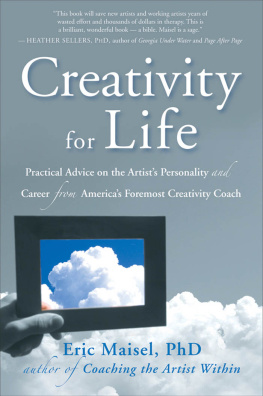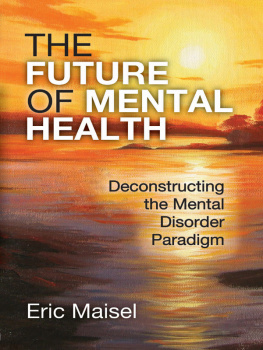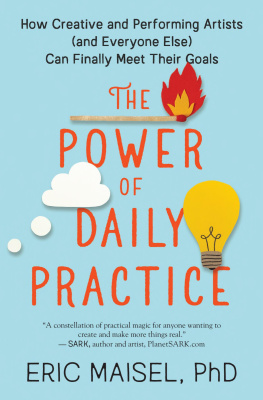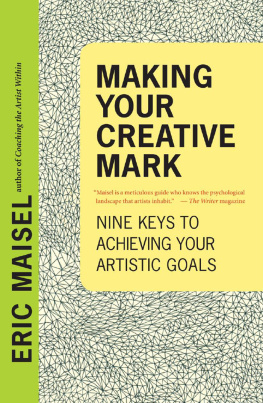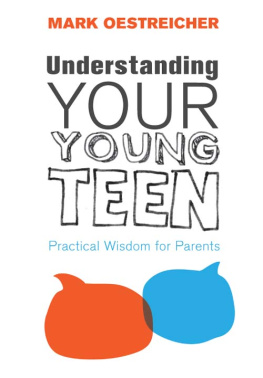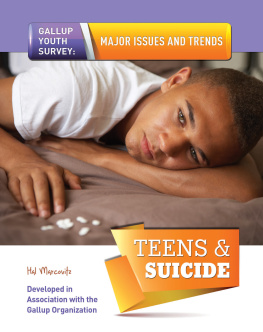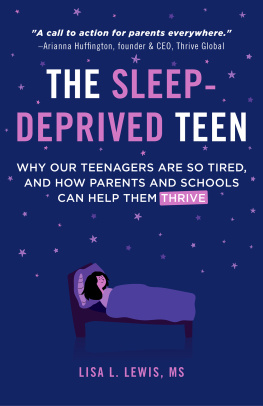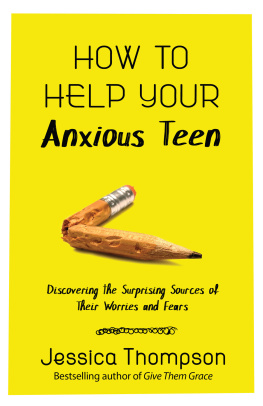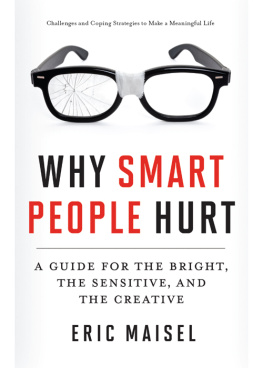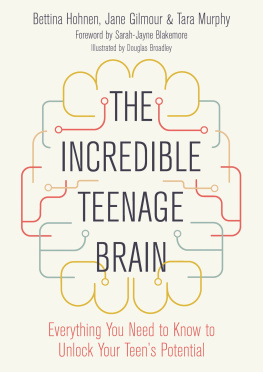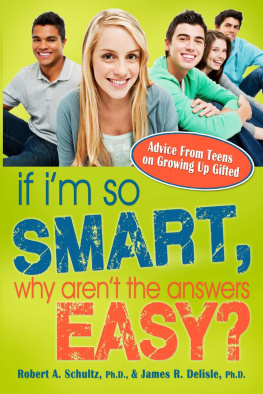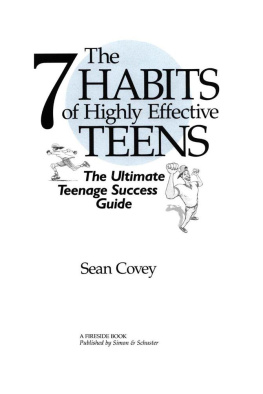Other books by Eric Maisel
Why Smart P eople Hurt
Redesign Your Mind
The Great Book of Journaling (edited with L ynda Monk)

Helping Adolescents Cope
with the Consequences of Intelligence
ERIC MAISEL

Coral Gables, FL
Copyright 2022 by Eric Maisel.
Published by Conari Press, a division of Mango Publishing Group, Inc.
Cover Design: Elina Diaz
Layout & Design: Carmen Fortunato
Mango is an active supporter of authors rights to free speech and artistic expression in their books. The purpose of copyright is to encourage authors to produce exceptional works that enrich our culture and our open society.
Uploading or distributing photos, scans or any content from this book without prior permission is theft of the authors intellectual property. Please honor the authors work as you would your own. Thank you in advance for respecting our authors rights.
For permission requests, please contact the publisher at:
Mango Publishing Group
2850 S Douglas Road, 4th Floor
Coral Gables, FL 33134 USA
For special orders, quantity sales, course adoptions and corporate sales, please email the publisher at or +1.800.509.4887.
Why Smart Teens Hurt: Helping Adolescents Cope with the Consequences of Intelligence
Library of Congress Cataloging-in-Publication number: 2022937647
ISBN: (print) 978-1-64250-997-7, (ebook) 978-1-64250-998-4
BISAC: FAM043000, FAMILY & RELATIONSHIPS / Life Stages / Teenagers
The author recognizes that teenagers (and others) have diverse gender identities, including non-binary identities, and diverse pronoun preferences. Throughout the book, gender-specific pronouns are used in examples. Whenever a gender-specific pronoun is used, it should be understood as referring to all genders and gender identities unless specifically stated. This has been done solely for the purpose of making the text easy to read; no discriminatory bias, sexism, or offense are intended to a ny person.
Table of Contents
My focus in this book is on the special challenges that smart teens face. I am interested in helping smart teens and their parents because smart teens are the ones who as adults will have the job of keeping civilization afloat. They will desalinate sea water, create vaccines, write novels that move hearts and engage minds, and stand up to fascists. They are our most important resourceand they ar e hurting.
One of my goals is to name and describe the challenges that smart teens face. A second goal is to not objectify teens but rather to try to communicate what it feels like to be inside their reality. For this reason, I intend to talk directly to teens in each lesson, as well as to their parents. A teen isnt someone with ADHD or someone with bipolar disorder. A smart teen is a rich, alive, thoughtful, often troubled person. I want the teens who read this book to feel heard and seen.
Maybe you are one of those smart teens. What does it feel like when you find your overactive brain racing and you have trouble doing things in a calm, settled way? How often does that racing lead to disorganization, procrastination, a sense of inner chaos, and real-world failures like poor grades? What does it feel like to have your imagination shut down because you need to learn facts for the test?
How will you react when your natural curiosity is met with hostility and youre instructed to stop asking impertinent questions? Or what will your response be when you receive mixed and deeply unsettling messages about how smart you are, on the one hand, and about how incompetent and unworthy you are, on the other? What does all this feel like? And what are the likel y results?
I hope that this book will prove something of a voyage of discovery, helping you to understand what its like to inhabit the racing and tempestuous mind of a smart teen. It is wild and unsettled in there. Even if your smart teen is just sitting there morosely, inside, their consciousness is teeming with mental activity. Their sleep is not untroubled, and their thoughts are likely not self-friendly. Their dirty laundry strewn everywhere in their room is a metaphor: their life may well be feeling like that.
Smart teens face the same challenges that all teens are bound to face, like peer pressure, and other challenges that only some teens have to face, like a history of abuse. There may be problems with alcohol and drugs; dealing with bullying and cyber bullying; alienation and hopelessness; stress and anxiety; social media and gaming excesses; self-doubt and self-criticism; and power struggles and battles with parents. There are also the pressures of poverty, the realities of parental discord and divorce, gloomy forecasts about the future of the world, and more.
On top of these, smart teens have their own special challenges. Those are the subject of this book. These include a special, complicated relationship to excellence, an often-abiding sense of being in the completely wrong place, an inability to find anything worth focusing on, existential sadness arising from a clear, unvarnished understanding of the facts of existence, and a poignant hunger for a life aligned with the phrase truth, beauty, and goodness, a life that does not seem at all availabl e to them.
Of course, to chat about these matters puts us squarely in the minefields of the intelligence debates. But let us picture ourselves as able to levitate over those debates and not get caught up in quagmires like, What is intelligence? and How dare you call someone smarter than someone else! and But arent there many intelligences? We dont need to define talented, gifted, intelligent, or any of the other words in the family of smart. Let us keep it this simple: If this book speaks to you, it speaks to you. That will be enough.
But I do need to say a few words about the following. When I say smart, do I also mean creative? Those two ideas are often conflated. Interesting studies from long ago attempted to answer the question, Are there differences between smart students and creative students? The answer appeared to be an unequivocal yes. The teachers surveyed had very clear ideas about how the first group differed from t he second.
In their view, non-creative smart students had very conventional attitudes and outlooks, leaned right rather than left, tended to pick money-making professions, and rather than delving deeply into subjects, demanded to be told what they needed to know for the test. They were smart but incurious and literal rather than imaginative. If they raised their hand, it was only to ask a question like, Do we need to remem ber that?
The smart teen who will become a sharp corporate lawyer is not the same person as the smart teen who will become an esoteric essayist. Smart teens are not a monolithic group, and an ability to think is not the same as a desire to create. It follows that not all of the challenges well discuss will fall equally on the shoulders of every smart teen. Let us keep that in mind as we look at the fifty challenges were about t o explore.
The world is wobbling. We cant expect a smart, angst-ridden teen to step up and put that wobbly world on her shoulders. They can perhaps barely manage to get out of bed! And still, we want to do everything in our power to help that teen survive her teenage years and become the person we so desperately need her to be: not a comic book superhero but an apostle of civilization, a committed individual who cares and who tries. May this book help smart teens navigate the maddeningly difficult years of ad olescence.

